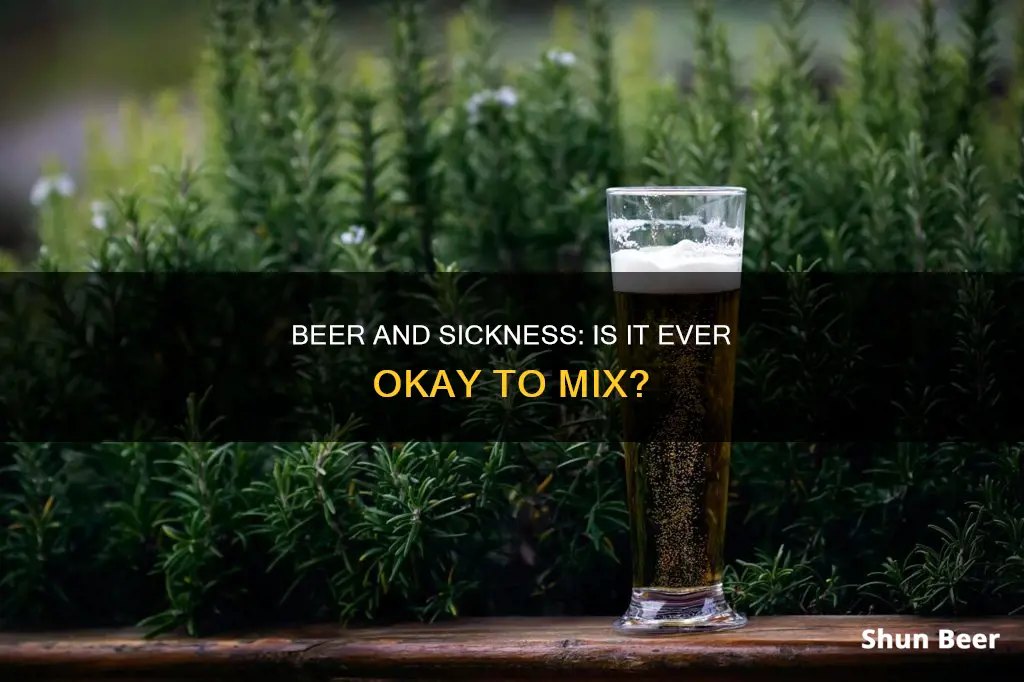
Drinking beer when you're sick is generally not recommended. Alcohol is treated as a toxin by the body and can weaken your immune system, making it harder to fight off illness. It can also cause dehydration, disrupt your sleep, and negatively interact with medication. While a small amount of alcohol may help you fall asleep faster, too much can disrupt your deep sleep phase, which is key to recovery. Additionally, alcohol can have harmful interactions with antibiotics and other medications, reducing their effectiveness.
| Characteristics | Values |
|---|---|
| Effect on illness duration | Drinking alcohol when sick can make an illness last a few extra days. |
| Effect on dehydration | Alcohol is a diuretic, which increases urine production and causes dehydration. Dehydration can worsen congestion. |
| Effect on liver | Alcohol and anti-inflammatory medications are both processed by the liver, so consuming both at the same time can put stress on the organ. |
| Effect on medication | Alcohol can cause medications to be more or less effective, or ineffective. It can also cause harmful side effects, such as dizziness, difficulty breathing, and mental health problems. |
| Effect on sleep | Alcohol can help people fall asleep faster, but it disrupts deep sleep, which is key to recovery. |
| Effect on immune system | Alcohol can weaken the immune system, making it easier to get sick. |
What You'll Learn

Beer and medicine don't mix
Drinking beer or any other alcoholic drink when you are unwell is not recommended, especially if you are taking medication. Alcohol can negatively interact with medicines, causing serious side effects and damaging your liver. It can also prevent medicines from working effectively, which may prolong your illness.
Negative Interactions with Medication
Alcohol interacts negatively with many medications, including common pain relievers, antibiotics, mood stabilizers, and sleeping pills. Mixing alcohol with medication can cause a range of harmful side effects, from headaches to irreversible damage, and even death. These interactions can occur even if you consume alcohol several hours after taking medication.
Prolonged Illness
When you drink alcohol while sick, your body prioritizes getting rid of the alcohol over fighting off the illness. This means that drinking beer when you are unwell can actually make your illness last longer. Alcohol can also disrupt your sleep, further weakening your immune system and delaying your recovery.
Dehydration
Both illness and alcohol can cause dehydration, which can worsen congestion and other symptoms. Alcohol is a diuretic, causing you to lose fluids and affecting various parts of your body, including your brain, skin, muscles, and liver. Dehydration can lead to cognitive impairments, skin problems, muscle cramps, and liver disease.
Liver Damage
Consuming alcohol while taking anti-inflammatory medications such as Tylenol or Advil can put a lot of stress on your liver, as both substances are processed by this organ. This can lead to serious liver damage.
Gut Health
Alcohol consumption can damage the microorganisms in your gut that support your immune system, making it easier for you to get sick. It can also alter your gut flora, damage the intestinal lining, and impair the function of immune cells in the respiratory tract, increasing your vulnerability to infections and diseases.
In summary, drinking beer when you are sick is not advisable, especially if you are taking medication. Alcohol can have negative interactions with medicines, prolong your illness, cause dehydration, damage your liver, and impair your immune system. It's best to avoid beer and focus on rest, hydration, and recommended treatments until you recover.
Old Beer, New Problems: Drinking Day-Old Beer Safely
You may want to see also

Alcohol increases dehydration
Drinking alcohol when you're sick is generally not recommended. One of the reasons for this is that alcohol is a diuretic, which means it increases the passing of urine at a fast rate. This can lead to dehydration, which is already a risk when you're unwell.
How Alcohol Causes Dehydration
When you drink alcohol, it is broken down in the liver and converted into acetaldehyde. This process can be harmful if acetaldehyde accumulates in the body. In addition, alcohol suppresses the production of the antidiuretic hormone, vasopressin, which causes the body to lose fluids, leading to dehydration.
The Effects of Dehydration
Dehydration caused by alcohol consumption can have various negative effects on the body. For example, dehydration can decrease cognitive functions like decision-making and environmental responsiveness. It can also affect hormone levels, leading to acne, and cause muscle stiffness or cramps.
Preventing Dehydration
To counter the dehydrating effects of alcohol, it is recommended to drink plenty of water and alternate between alcoholic and non-alcoholic beverages. Eating before consuming alcohol can also help slow the absorption of alcohol into the bloodstream, reducing the impact of dehydration.
Beer and Basketball: College Game Drinking Rules Explained
You may want to see also

It weakens your immune system
Drinking beer when you're sick is not a good idea. While it may seem like a good way to relax and soothe yourself to sleep, it can actually weaken your immune system. Here's why:
Your Body Prioritizes Metabolizing Alcohol Over Fighting Off Infections
When you drink alcohol, your body treats it as a toxin and prioritizes metabolizing it over all other substances. This means that while you're sick, your body is busy breaking down alcohol instead of focusing on fighting off the illness. This leads to a slower recovery. Even on your healthiest days, your body can only metabolize about one ounce of alcohol per hour. Drinking more than that will burden your system, which will have to fight off both the sickness and the alcohol.
Alcohol Damages Your Immune Cells
The microorganisms in your gut play a crucial role in supporting your immune system. Alcohol consumption can damage these microorganisms, inhibiting their ability to keep you healthy. Immune cells that normally fight off infections are weakened by the presence of alcohol in your bloodstream, making it easier for you to fall sick.
Alcohol Disrupts Your Sleep Cycle
Alcohol is known to impair the quality of your sleep, which in turn weakens your immune system. The less sleep you get, the weaker your immune system becomes, making it less effective at fighting off virus-infected cells. Even small amounts of alcohol can negatively impact your body's ability to fight off infections.
Alcohol Increases Dehydration
When you're sick, staying hydrated is crucial for a speedy recovery. However, alcohol is a diuretic, which means it increases urine production, leading to dehydration. Dehydration caused by alcohol consumption can affect various parts of your body:
- Brain: Dehydration can decrease cognitive functions like decision-making and environmental response.
- Skin: Alcohol-induced dehydration can alter hormone levels, leading to acne.
- Muscles: Dehydration can cause muscle stiffness and cramps.
- Liver: Alcohol dehydration can lead to fat and protein buildup in the liver, potentially resulting in liver disease.
In summary, drinking beer when you're sick is not advisable as it can weaken your immune system and prolong your recovery. It's best to avoid alcohol and focus on getting the rest and hydration your body needs to heal.
Bunnies and Beer: A Dangerous Mix?
You may want to see also

Alcohol and liver issues
Alcohol-related liver disease (ARLD) is liver damage caused by excess alcohol intake. ARLD has several stages of severity and symptoms, and it's common in the UK. The liver is one of the most complex organs in the body, responsible for filtering toxins from the blood, aiding digestion, regulating blood sugar and cholesterol levels, and helping fight infection and disease.
Each time the liver filters alcohol, some liver cells die, and while the liver can develop new cells, prolonged alcohol misuse over many years can reduce its ability to regenerate, resulting in serious and permanent damage.
- Alcoholic fatty liver disease: Even a few days of heavy drinking can lead to a build-up of fats in the liver, causing an enlarged liver. This stage rarely causes symptoms but is a warning sign of harmful drinking levels. Fatty liver disease is reversible if one stops drinking alcohol for a few weeks to a few months.
- Alcoholic hepatitis: Alcohol misuse over a more extended period can cause acute inflammation of the liver, leading to permanent scarring. This stage can be life-threatening and is often when people first realise they are damaging their liver.
- Cirrhosis: This is a severe stage of ARLD where the liver has significant scarring. It is generally irreversible, but stopping drinking alcohol immediately can prevent further damage and increase life expectancy.
The most effective way to prevent ARLD is to stop drinking alcohol or stick to recommended limits. Even heavy drinkers can reduce their risk of ARLD and improve their liver and overall health by reducing alcohol intake.
In addition to ARLD, drinking alcohol while sick can have other adverse effects. Alcohol can weaken the immune system, prolong illness, cause dehydration, and negatively interact with medications, leading to complications such as internal bleeding, liver damage, heart issues, and respiratory problems.
Beer's Carbonation: What Makes it Fizz?
You may want to see also

It can disrupt your sleep
Drinking beer when you're sick is not a good idea, and one of the reasons is that it can disrupt your sleep. While a small amount of alcohol can help you fall asleep faster, too much alcohol disrupts your deep sleep phase, also known as rapid eye movement sleep (REM). The deep sleep phase defines the quality of our sleep. Any disruption to REM sleep can lead to feelings of anxiety and daytime drowsiness, which can make you feel worse if you're already sick.
When you're sick, your body is already weakened and is sending signals to your brain to sleep so that it can focus on healing. While alcohol can give you a short burst of energy, in the long run, you'll feel more drowsy. This is because when alcohol enters your bloodstream, it affects your central nervous system, leading to feelings of forgetfulness, dizziness, and drowsiness.
Alcohol reduces the ability of neurons or brain cells to fire properly, resulting in increased lethargy or sleepiness. Additionally, the negative impact of alcohol on sleep can be influenced by factors such as alcohol tolerance, lack of sleep, and the type of food consumed beforehand. For example, a carb-heavy meal before drinking can induce drowsiness.
So, while a hot toddy or a beer might seem like a good idea to help you sleep when you're sick, it's likely to do more harm than good. It's best to save that drink for when you're feeling better and focus on getting a good night's rest instead.
Beer and Dieting: Can You Have Your Cake and Drink, Too?
You may want to see also
Frequently asked questions
No, it is not recommended to drink beer or any other alcoholic beverage when you are sick. Alcohol can negatively impact your immune system, cause dehydration, and cause harmful interactions with medication.
Alcohol is treated as a toxin by your body and is prioritised for metabolisation over other substances. This means your body is left fighting both the sickness and the alcohol, slowing down your recovery. Alcohol also damages your gut microbiome, inhibiting the microorganisms that support your immune system.
Alcohol is a diuretic, which means it increases urine production and causes your body to remove water and nutrients from your blood. Dehydration can affect your brain, skin, muscles, and liver, and can worsen congestion.
Alcohol can cause harmful interactions with many medications, including pain relievers, mood stabilisers, antibiotics, sleeping pills, and cold and flu medications. Always consult your doctor or pharmacist if you are unsure whether it is safe to consume alcohol while on medication.







